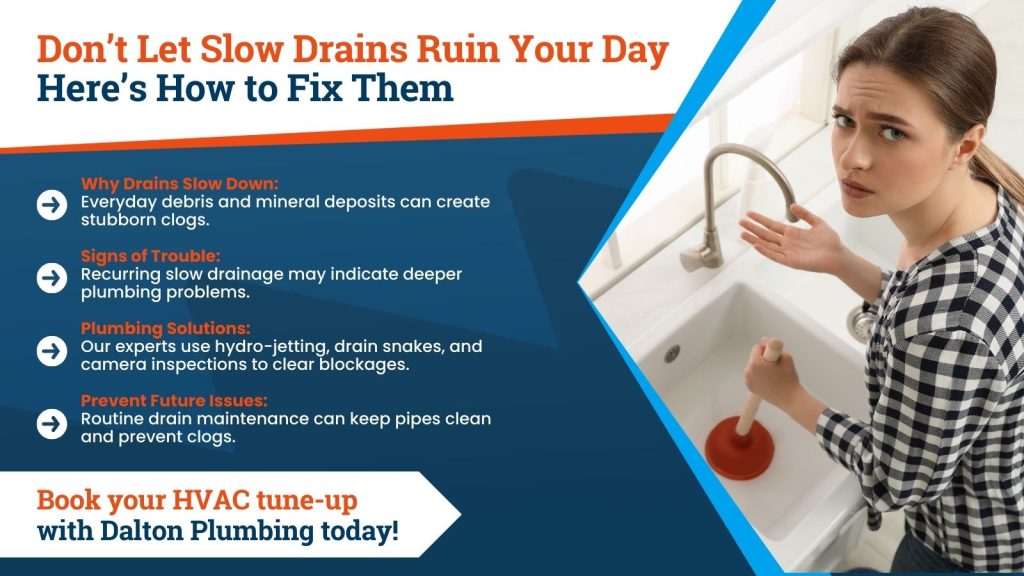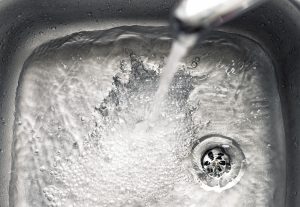Slow drains are a common nuisance in any home, and understanding the root causes can help you take preventative measures while also knowing when to call in a professional. Over time, debris and buildup inside your pipes can narrow the passageway for water, leading to slow-draining sinks, bathtubs, and showers. In this post, we’ll explore how slow drains occur, why they happen, and what a professional plumber can do to resolve the issue.
Remember, our team can provide drain cleaning in Cedar Rapids on a regular basis. Leave it up to the Dalton plumbers to get this problem fixed!

How Slow Drains Occur
Slow drains typically begin with small amounts of debris accumulating along the interior walls of your pipes. Everyday substances like hair, soap scum, grease, and food particles gradually stick to the pipes, eventually forming a blockage that restricts water flow. In kitchens, grease from cooking can congeal and stick to the sides of the pipes, while in bathrooms, strands of hair combine with soap residue to create stubborn clogs. These issues mirror what can happen inside your HVAC system over time—ductwork can also collect debris and dust, reducing air quality and system efficiency if not properly maintained. Over time, these deposits can become significant enough to hinder the natural flow of water, leading to the slow drain issues you may notice during your daily routine.
Why Drains Slow Down
Several factors contribute to slow drains. One of the primary reasons is the accumulation of organic material that naturally adheres to the inner surfaces of your plumbing. When this buildup is not regularly cleared, it acts as a barrier that restricts water flow. Similarly, in your HVAC system, dust, dander, and even mold spores can collect unnoticed, impacting both comfort and air quality. That’s why it’s worth considering how regular duct cleaning can improve airflow and reduce system strain across your entire home.
In addition to buildup, external factors like mineral deposits from hard water can exacerbate the problem, leaving behind a film that further narrows the drain opening. Sometimes, slow drains may also be a sign of more serious issues such as partial blockages caused by tree roots infiltrating underground pipes or even damage to the pipes themselves due to aging or corrosion.
Improper installation or changes in water pressure can also play a role. If pipes are not installed at the correct slope, water may not flow as smoothly as it should, leading to areas where debris can settle. Even everyday usage, if not managed with proper care—like pouring grease down the kitchen sink—can contribute to the problem over time.
What a Professional Plumber Can Do
When it comes to addressing slow drains, a professional plumber is your best ally. First, they can diagnose the issue accurately using specialized tools like high-pressure water jets, motorized drain snakes, or even camera inspections. These methods allow them to pinpoint the exact location and cause of the blockage without having to dismantle your plumbing system entirely. And just like drain lines, your ductwork requires professional attention to maintain indoor air quality and system efficiency—especially if it’s been years since your last cleaning or inspection.
Once the problem is identified, a plumber can then employ several effective techniques to restore proper drainage. For minor clogs, a thorough cleaning using hydro-jetting can blast away years of accumulated grease and debris. In other cases, mechanical tools like drain snakes and plungers might be used to physically remove stubborn buildup or to snare and extract hair clumps.
In addition to clearing the blockage, a trusted plumbing contractor will offer advice on preventive measures. This might include installing drain guards or screens to catch debris, recommending regular maintenance schedules, or suggesting modifications to your home’s drainage system to improve flow. By taking these proactive steps, a plumber can minimize the likelihood of future slow drain issues and protect your home from more severe plumbing problems down the line.
At Dalton Plumbing, Heating, Cooling, Electric and Fireplaces, Inc., your comfort is our promise! To set up an appointment in the Cedar Rapids area, give us a call at the number above, email customerservice@daltonphc.com or schedule an appointment online.

